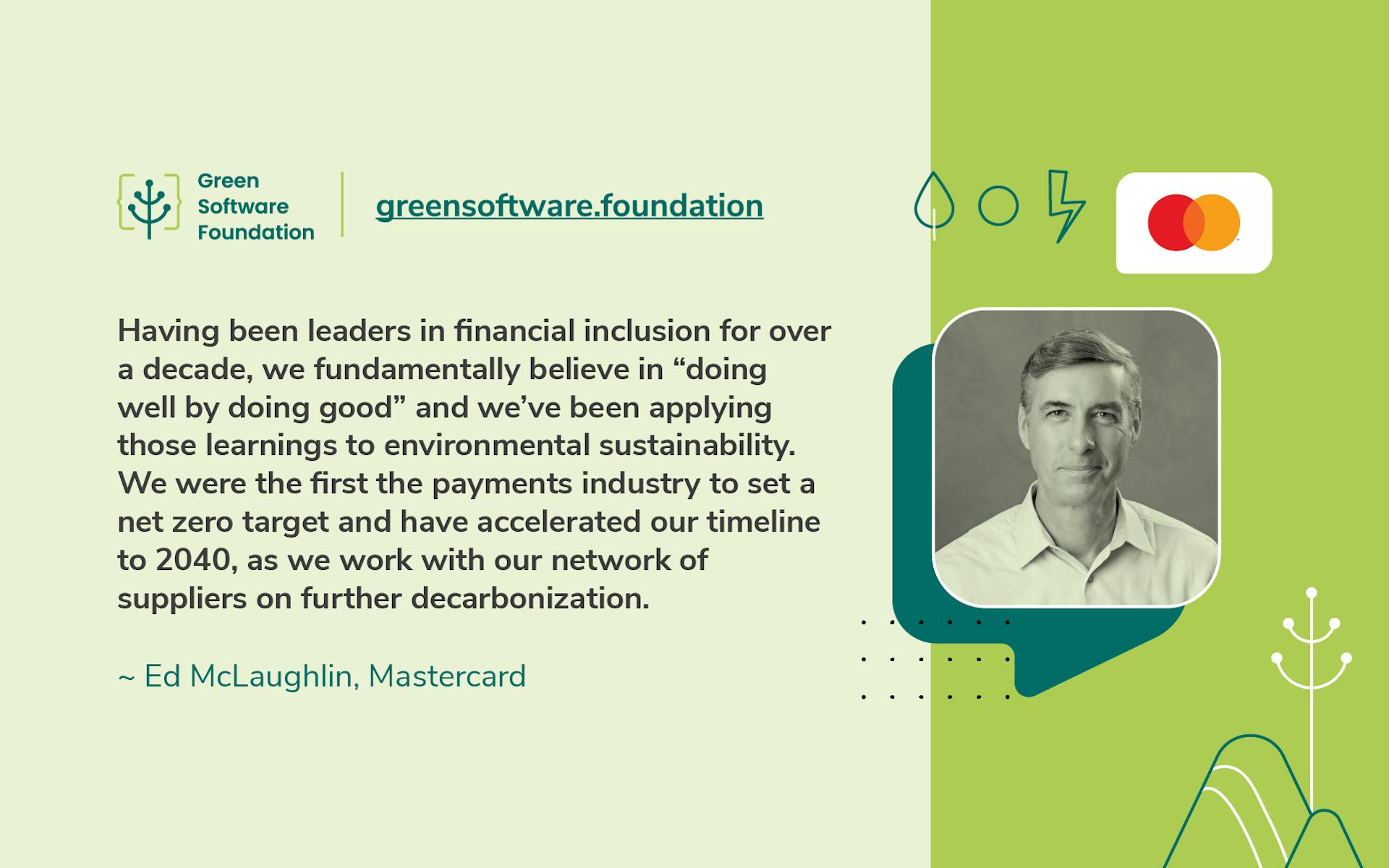First, tell us about Mastercard.
Mastercard is a technology company in the global payments industry. Our mission is to connect and power an inclusive, sustainable digital economy that benefits everyone, everywhere, by making transactions safe, simple, fast and accessible.
As with many technology companies, our carbon footprint is relatively small, but we know that we can make a meaningful impact to address climate change by reducing the greenhouse gas (GHG) emissions of our own operations and providing sustainable solutions for our global network of customers and consumers. Having been leaders in financial inclusion for over a decade, we fundamentally believe in “doing well by doing good” and we’ve been applying those learnings to environmental sustainability. We were the first the payments industry to set a net zero target and have accelerated our timeline to 2040, as we work with our network of suppliers on further decarbonization.
We are proud of the work we have done to date, but also realize there is always more to do – and we will continue to apply our technology, data, innovation capacity, and talent to be a force for good and tackle the global climate crisis.
As a General member, your organization is obviously committed to the cause of greener software. What do you plan to achieve together with the GSF, for your business, for your clients and for the world?
We know that the climate crisis requires collective action and that by partnering with like-minded organizations such as the Green Software Foundation (GSF), we can continue to forge new pathways for technology companies to make a positive impact on the environment. Our aim at Mastercard is to build a digital economy that is both inclusive and sustainable, one that continuously works for – not against – the environment. And the only way we can do that is through collaboration and innovation.
How does your organization see the future of green software?
We are embedding our “doing well by doing good” philosophy in everything we do. In fact, to create shared accountability, we are now linking compensation for all employees directly to priorities across Environmental, Social and Governance (ESG) goals, including decarbonization of our operations.
As we continue to embed sustainability across our business, we are considering all the ways our company can drive positive change – and that includes the work of our technology and engineering teams.
We understand that software, hardware, energy consumption, and emissions are all linked. As an organization with ambitious goals related to net zero, we continue to reduce our own carbon footprint and see green software as another way to further move that needle.
Since software drives infrastructure use, creating more sustainable software will increase efficiency of our data centers and generate beneficial impacts across the enterprise. By developing and using “green software,” we envision creating and deploying applications that require fewer hardware resources, less computational energy, and lower associated carbon.
We also have a unique role as a business sitting at the center of global commerce. With a network touching 90 million merchants, 20,000 customers and nearly 3 billion consumers, we must also think about the products and services we build for them. Not only are we developing sustainable software that produces more positive outcomes for the environment from an energy usage perspective, but we’re also creating digital products that support “green” thinking and behaviors. Through our new Sustainability Innovation Lab, for instance, we are advancing the Mastercard Carbon Calculator (created with fintech Doconomy). This tool is now embedded across our global technology network, helping consumers understand their carbon footprint and the environmental impacts of their purchases.
What challenges do you see ahead and how can we overcome them?
One of the challenges – and opportunities – facing the industry is around aligning on best practices, principles and metrics for green software and its impacts. The idea of establishing baselines and measuring is fundamental to our work now and into the future. Since this is emerging work, we believe in the power of collective brainpower and action. That’s why we are so excited to become a member of the GSF. Working with other industry thought leaders through the GSF will enable all of us to improve how we deliver value in a responsible way to support our business, the environment, and communities around us.
At Mastercard, we will focus on defining what green software means to our operations specifically. We’re interested in creating our own measures and baselines, setting goals, learning as we go and implementing improvements. Ultimately, we want to be able to quantify the results of our sustainability focused actions, so we can embed those practices within our technical operations – delivering benefits to Mastercard, our customers and partners, and our planet.
This article is licenced under Creative Commons (CC BY 4.0)

